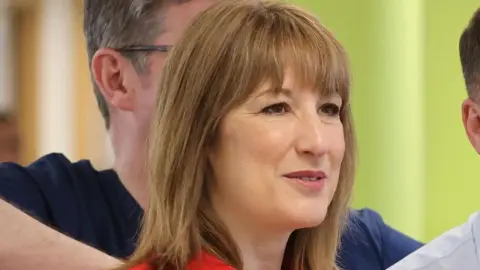Reeves bounces back after tears but challenges remain
 PA Media
PA MediaIt might be uncomfortable territory, but it's worth reflecting on just how unprecedented Wednesday's events in the House of Commons were.
The images blared across the media of Rachel Reeves in tears as Sir Keir Starmer answered questions from the dispatch box were devastating for a chancellor who has made having an iron core central to her public image.
Some believe it is unfair for the media to note that the chancellor was visibly distraught on live television for half an hour.
Yet the markets, which quickly responded unfavourably, did not wait for media coverage to decide to trade against Britain.
Perhaps counter-intuitively, those market movements point the way through this for Reeves.
At least in the interpretation of many, the markets were responding to the possibility that Reeves might soon be replaced as chancellor, and that her replacement would be less committed than her to limiting government borrowing for day-to-day spending.
That may be why the markets then bounced back when Sir Keir Starmer told the BBC's Nick Robinson that Reeves would remain chancellor for many years to come.
Reeves's brief interview this afternoon was also geared at reassurance, attributing her tears to a "personal issue" and a "tough day".
She insisted she was "totally" up for the job of chancellor - and that she and the prime minister would continue to work in "lockstep together".
It came after she made an unscheduled appearance at an East London hospital for the launch of the government's 10-year NHS plan.
She made no mention of her tearful episode in the short speech she made about the health service and the economy.
But there were smiles all around and a hug from the prime minister, who said it was "just fantastic that she is here".
That's probably enough to draw a line under this excruciating episode.
But the challenge for Reeves remains the same as it was just before PMQs began.
There is a straightforward difference of opinion between the chancellor (plus the prime minister and perhaps the bond markets), and a large group of Labour MPs.
The gutting of the government's welfare policy - in a series of panicky U-turns - displayed this in vivid detail.
The rebel MPs who forced the U-turns believe strongly that a Labour government should not be, as many put it, "balancing the books on the backs of the poor".
But it's broader than just that.
"If the chancellor comes to us in the autumn with a cuts Budget," one member of the government said, "Labour MPs will say no."
Yet the chancellor, in turn, is firm in her belief that the markets will not wear further borrowing for day-to-day spending, and that therefore the choice is either spending restraint or tax rises.
On tax, she is hemmed in by the promises she and the prime minister made during the general election campaign.
Those fundamental tensions between what Reeves, Starmer and - it seems - the markets want on the one hand, and what the Parliamentary Labour Party wants on the other will have to be resolved before long.

